The boxing world is still abuzz following Oleksandr Usyk’s Moscow masterpiece.
Usyk, now 15-0-0 with 11 KO’s, became the first winner of the inaugural World Boxing Super Series with a twelve round boxing clinic against previously unbeaten Russian Murat Gassiev on July 21st. With the victory, Usyk not only established himself as the sport’s premier cruiserweight, but also captured the coveted Muhammad Ali Trophy, named in honour of ‘The Greatest’ – with whom Usyk incidentally shares his birthday.
With his overwhelming decision victory over home-soil hero Gassiev, the 2012 Olympic gold medallist and pride of Ukraine also became the first man in the history of the sport to unify all four cruiserweight World title belts.
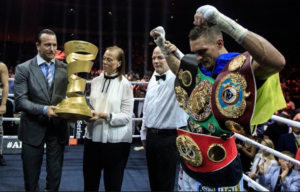
Savants of the sweet science may point out that that Evander Holyfield was the first undisputed cruiserweight champion; holding the WBA, WBC and IBF belts simultaneously in 1988 at a time when the WBO version did not exist. But even they would be hard-pressed to deny, in the wake of Saturday night, that Usyk – the epitome of a throwback fighter – would have been a more-than-worthy adversary if he had fought in ‘The Real Deal’s’ era.
Leading up to the WBSS cruiserweight final, the odds which at the tournament’s inception had been firmly fixed in Usyk’s favour had narrowed to the point that it was effectively regarded as a 50:50 fight among boxing fans.
In the first semi-final, Usyk had won a hard-fought majority decision against teak-tough Latvian Mairis Briedis in which he was pushed like he never had been before in his short professional campaign. In contrast, Gassiev produced the best performance of his career in the second semi-final to outbox and stop feared Cuban puncher Yunier Dorticos in thrilling and dramatic fashion.
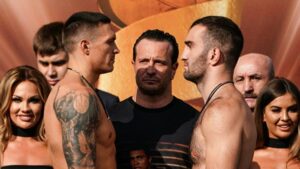
The contrast in styles and background combined brought an extra layer of intrigue to the contest; Usyk bringing amateur pedigree, athleticism, skills and boxing IQ; Gassiev bringing youth, raw strength, durability and power.
Meanwhile, peripheral circumstances were raising just as many questions.
The final, originally meant to be held on May 11 in Jeddah, Saudi Arabia, was postponed due to Usyk suffering an injury in training and moved to Moscow – eliciting cries of home-town robbery before the event had even begun.
Fighting away from home is nothing new for Usyk: he won the WBO title in Poland against Krzysztof Glowacki and had made all four defences of his title on the road – which included punishing Michael Hunter in the United States, stopping former titleholder Marco Huck in Germany and outpointing Briedis in Latvia.
However, given strained political relations between Ukraine and Russia, the thought of a Ukrainian fighting in Moscow against a Russian only exacerbated the boxing doomsayers’ suspicions.
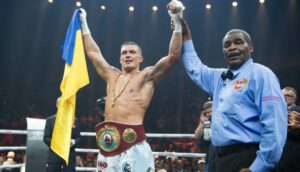
For context, in 2014, Russia forcibly annexed Crimea, an autonomous republic of Ukraine, with the support of pro-Moscow loyalists, to the outrage of Ukrainians and much of the rest of the world. The Crimean capital, Simferopol, just happens to be Usyk’s birthplace.
With all of this meshed together in the rear window, the televised portion of the WBSS cruiserweight final undercard could not have got off to a more ominous start.
Nadjib Mohammedi was a decided underdog against former WBA super middleweight champion Fedor Chudinov but gave his opponent a boxing lesson – as was apparent to most viewers, but not the judges who awarded a ludicrous split decision to the home fighter that will go down as one of the worst of the year.
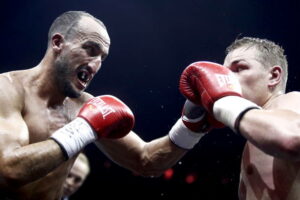
The two contests which followed, Braekhus-Sagaydakovskaya and Briedis-Deslaurier, deservedly went the way of the favourites, but, in an unsettling break with boxing tradition, the judges’ scores were not read out after their conclusion. Tension was palpable in the air as Usyk and Gassiev made their way to the ring, but true to form neither showed any sign of it in spite of the occasion and the charged atmosphere.
Usyk set a fast pace, nearly tripling Gassiev’s punch output in the first three rounds. Gassiev had also started slow against Dorticos, but had worn out his opponent over the course of the bout with his harder, cleaner shots and brutal, effective body punching.
Here, however, Gassiev was facing a far more elusive foe – with Usyk sweeping the first three rounds almost solely with his jab and cat-like movement. Although Gassiev landed the harder single shots, they were few and far between. There was a brief moment of drama near the end of the fourth round when the home favourite connected with a big right hand which stunned Usyk, but the blow came too close to the bell for him to capitalise.
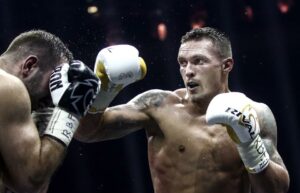
It was all Usyk in the middle rounds, pumping his jab, turning his man and throwing some beautiful combinations. Gassiev was starting to look discouraged; unable to solve the puzzle in front of him. Usyk’s constant movement was giving him fits and he was being reduced to plodding ineffectually around the ring while being peppered with shots from all angles.
The sense of urgency increased in his corner as Abel Sanchez implored his fighter to up his work-rate, even resorting to the age-old tactic of threatening to stop the fight to try and motivate him. It had zero effect; Usyk was now in complete control and the sense of danger posed by Gassiev in the early rounds was rapidly dissipating.
In spite of his fast start and knowing that he was winning the fight by a virtual shutout, Usyk showed no signs of slowing down in the late rounds. In fact, he upped his work-rate – throwing 91 punches in the tenth round, 101 in the eleventh and closed the show wonderfully in the final round: throwing 117 punches and landing 47 of them for a fight-high connect percentage against a weary and ragged Gassiev. If the contest had been fought in the days of 15-rounders, it is quite possible that Usyk could have stopped his foe.
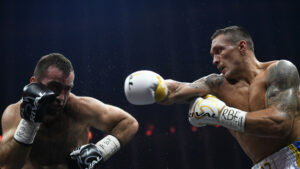
In the final seconds, assured of a resounding victory, Usyk even performed an Ali shuffle – a nod to the man whose name would be on the trophy he was virtually guaranteed to collect.
The bell to end the fight rang and the two fighters sportingly embraced. Gassiev had once again proved toughness befitting his nickname, but knew that he – a world-class fighter with elite power – had just been handed a boxing masterclass.
Usyk looked to the heavens and then knelt in prayer, visibly emotional, knowing that he had just made history. So utterly dominant, so masterful had Usyk’s performance been, that the pre-existing fears of dubious judging had been put firmly to bed and the resulting scorecards of 119-109 twice and 120-108 in his favour were a mere formality.
With all four belts draped across his shoulders, Usyk received the ample Muhammad Ali Trophy, presented by the late icon’s widow Lonnie, and held it aloft in triumph.
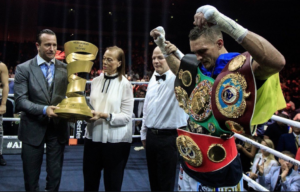
It is a good time to be Oleksandr Usyk; history-maker, owner of all the belts, millions of dollars richer and with plenty of attractive career options available.
There is little left for him to prove at cruiserweight, although a fight against WBC Emeritus Champion Tony Bellew, who Usyk called out in his post-fight interview, would be a guaranteed money-spinner. Since his virtuoso performance against Gassiev, both Bellew and his promoter, Eddie Hearn, have voiced their interest in a potential showdown: however, with Bellew in the twilight of his career, it beggars belief that he would choose a hungry, skilled animal such as Usyk as his bout to sail off into the sunset…
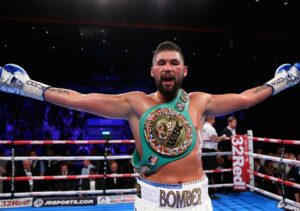
A far more tantalising possibility is a permanent move up to heavyweight to challenge the sport’s big men. With Anthony Joshua and Deontay Wilder leading the pack and the reintroduction of Tyson Fury into the mix, the heavyweight division is heating up after years of stagnation – and the addition of Usyk would ratchet the temperature up further.
Although he would face a significant size disadvantage against all the aforementioned names, his skill level is on such a stratospheric level – certainly far beyond anything which any of them have ever faced – as to pose a legitimate threat.
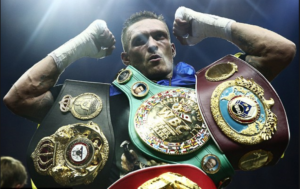
Only time will tell, but for now, he and boxing fans can sit back and savour a triumph not just for him but for the concept of the World Boxing Super Series and the sport; a throwback to a golden age when the best fought the best and a reminder that the results of this can be very special indeed.
What more could we ask for?
Article by: Paul Lam
Follow Paul on Twitter at: @PaulTheWallLam